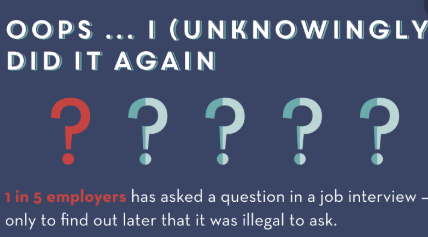Illegal Interview Practices to Avoid

By Debbie Gregory.
The U.S. Equal Employment Opportunity Commission (EEOC) was created to protect job candidates and employees from discrimination. When interviewing, it is best to avoid any line of questioning that could potentially be viewed as discriminatory.
You cannot ask a candidate or employee about:
- Age
- Disability
- Genetic information
- Race or ethnicity
- Gender identity
- Where they live
- Sexual orientation
- National origin
- Religion
- Marital status
- Having children, pregnancy, or plans to start a family
- Arrest record
- Financial status
When interviewing a pool of candidates for a job, make sure that you only use one set of interview questions for every potential employee. If you ask each person a different set of questions, that can be viewed as discriminatory and create liability for you.
Make sure to avoid these topics when preparing your list or asking interview questions:
- Asking about their arrest record. You can ask if someone has previously been disciplined by a past employer for violating policy but asking about arrests or other legal problems is a huge no-no.
- Asking about their current salary. Most states currently have a salary history ban in place; it is a good idea to avoid this question. You might ask them what about their compensation expectations with your company.
- Asking where they live. This could be construed as discrimination
- Asking if they are comfortable working under someone younger than the candidate. Asking a question like this can be viewed as age discrimination.
- Asking about drug usage. This one seems like a valid question yet businesses are not allowed to discriminate against recovering addicts or people who take prescription drugs for a health condition. If drug use/abuse is a concern then stick with pre-employment drug screenings instead.
- Asking about their accent or country of origin. If fluency is a concern, you can ask what languages they are fluent in but avoid asking if English is their first language or if they are a native speaker.
- Asking what class they graduated with at any school they attended. This is another question that can be viewed as age discrimination.
- Asking about their family or plans to have a family. This is one of the topics that generally comes up when interviewers stray into small talk and is a huge no-no. Someone’s family planning is not relevant to the job they are being interviewed for and asking any questions related to this topic will land you in trouble with the EEOC.
There are a few cases where you may need to know certain sensitive items such as physical health, education, legal convictions, or availability. When you do need to touch on these topics you must be careful about how to discuss them. Any of these types of questions (or really any questions you ask) need to be clearly related to the job in question and the fitness of the person to perform the tasks and responsibilities if hired.
Generally stay away from:
- Any questions not directly related to the job.
- Don’t ask anything that you cannot learn by looking at their social media or other public websites.
- Be very clear about what qualities, skills, or traits a person will need for the role they are applying for.
- Avoid personal conversations.
Many of these questions not to ask are obvious but often asked anyway. It is not only illegal interview questions that can get you into trouble. Never promise or hint to any candidate that you think they may get the job because if they do not, it can create liability. Additionally, promising long-term job security, implying a specific career path, or hinting that they could quickly advance in the company should be avoided. You can say state general opportunity terms for all employees but avoid anything that can be construed as promises.
Always be sure that you are conducting your interviews in the most fair and legal manner possible. If you need assistance or have questions please visit the EEOC website at https://www.eeoc.gov/.










